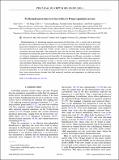Prethermal quasiconserved observables in Floquet quantum systems
Author(s)
Yin, Chao; Peng, Pai; Huang, Xiaoyang; Ramanathan, Chandrasekhar; Cappellaro, Paola
DownloadPublished version (909.7Kb)
Publisher Policy
Publisher Policy
Article is made available in accordance with the publisher's policy and may be subject to US copyright law. Please refer to the publisher's site for terms of use.
Terms of use
Metadata
Show full item recordAbstract
© 2021 American Physical Society. Prethermalization, by introducing emergent quasiconserved observables, plays a crucial role in protecting periodically driven (Floquet) many-body phases over an exponentially long time, while the ultimate fate of such quasiconserved operators can signal thermalization to infinite temperature. To elucidate the properties of prethermal quasiconservation in many-body Floquet systems, here we systematically analyze infinite-temperature correlations between observables. We numerically show that the late-time behavior of the autocorrelations unambiguously distinguishes quasiconserved observables from nonconserved ones, allowing one to single out a set of linearly independent quasiconserved observables. By investigating two Floquet spin models, we identify two different mechanisms underlying the quasiconservation law. First, we numerically verify energy quasiconservation when the driving frequency is large, so that the system dynamics is approximately described by a static prethermal Hamiltonian. More interestingly, under moderate driving frequency, another quasiconserved observable can still persist if the Floquet driving contains a large global rotation. We show theoretically how to calculate this conserved observable and provide numerical verification. Having systematically identified all quasiconserved observables, we can finally investigate their behavior in the infinite-time limit and thermodynamic limit, using autocorrelations obtained from both numerical simulation and experiments in solid-state nuclear magnetic resonance systems.
Date issued
2021Department
Massachusetts Institute of Technology. Research Laboratory of Electronics; Massachusetts Institute of Technology. Department of Electrical Engineering and Computer Science; Massachusetts Institute of Technology. Department of Nuclear Science and EngineeringJournal
Physical Review B
Publisher
American Physical Society (APS)